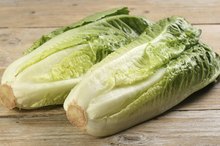What does fact checked mean?
At Healthfully, we strive to deliver objective content that is accurate and up-to-date. Our team periodically reviews articles in order to ensure content quality. The sources cited below consist of evidence from peer-reviewed journals, prominent medical organizations, academic associations, and government data.
- Office of Dietary Supplements: Folate
- Harvard Health Publications: Listing of Vitamins
- Office of Dietary Supplements: Iron
The information contained on this site is for informational purposes only, and should not be used as a substitute for the advice of a professional health care provider. Please check with the appropriate physician regarding health questions and concerns. Although we strive to deliver accurate and up-to-date information, no guarantee to that effect is made.
Grits Nutritional Value
The old English word "grits" originally referred to any coarsely ground grain. In the United States, it’s more specifically used to mean grits made from corn. While grits contain protein, fiber and a range of vitamins and minerals, they’re not naturally a good source of any nutrient except selenium. The good news is that most brands of grits are enriched, so you can count on a boost of B vitamins and iron.
Yellow and White Grits Compared
Grits, corn grits and hominy grits all refer to the same food, but plain hominy is different. Hominy is the name used for yellow or white corn kernels, which are hulled and have the bran and germ removed. To make grits, hominy is dried and ground to a consistency similar to coarse sand. The grits are then boiled and served as a breakfast cereal or a savory side dish. One cup of cooked yellow grits has 151 calories and 32 grams of carbohydrates. The same portion of white grits has 182 calories and 38 grams of carbs. Both types have 3 to 4 grams of protein and 2 grams of fiber.
- Grits, corn grits and hominy grits all refer to the same food, but plain hominy is different.
- Hominy is the name used for yellow or white corn kernels, which are hulled and have the bran and germ removed.
Enriched With B Vitamins
List of Iron-Enriched Foods
Learn More
If the grits you buy are not enriched, a serving will only have a small amount of B vitamins. Most grits are enriched, however, making them a good source of thiamin, riboflavin and niacin. All of these vitamins activate enzymes responsible for converting food into energy and keeping your nervous system healthy. You'll also get 21 percent of your recommended dietary allowance of folate from 1 cup of yellow grits and 25 percent from white grits 5. Folate helps synthesize DNA, which makes it vital for the growth and development of cells. It’s essential for preventing birth defects that develop in the first few weeks after conception.
- If the grits you buy are not enriched, a serving will only have a small amount of B vitamins.
- All of these vitamins activate enzymes responsible for converting food into energy and keeping your nervous system healthy.
Natural Source of Selenium
Selenium combines with proteins to form selenoproteins. These selenoproteins fill a number of jobs, including regulating the metabolism of thyroid hormones and producing antioxidants. In fact, the Institute of Medicine determined the recommended dietary allowance for selenium -- 55 micrograms daily -- based on the amount you need to synthesize an antioxidant called glutathione peroxidase. Selenium-dependent glutathione protects cells, especially cell membranes, from damage caused by free radicals. One cup of cooked yellow grits naturally supplies 6 micrograms of selenium, while white grits have 8 micrograms.
- Selenium combines with proteins to form selenoproteins.
- These selenoproteins fill a number of jobs, including regulating the metabolism of thyroid hormones and producing antioxidants.
Iron Boost When Fortified
What Makes an English Muffin Healthy?
Learn More
Grits naturally contain a small amount of iron, but if the label states that the cereal is enriched, more iron has been added, according to regulations established by the U.S. Food and Drug Administration 8. The amount added still varies, so check the nutrition label to see how much is in the brand you buy. Generic, enriched, yellow grits contain 1.3 milligrams of iron in a 1-cup serving, and white grits have 1.5 milligrams, according to the USDA Nutrient Database 23. Because your body loses iron when you bleed, premenopausal women should consume 18 milligrams daily. Men and post-menopausal women only need 8 milligrams in their daily diet.
Related Articles
References
- Cook’s Thesaurus: Corn
- USDA Nutrient Database: Cereals, Corn Grits, Yellow, Regular and Quick, Enriched, Cooked With Water, Without Salt
- USDA Nutrient Database: Cereals, Corn Grits, White, Regular and Quick, Enriched, Cooked With Water, Without Salt
- NutritionValue.org: Cereals, Without Salt, Cooked With Water, Unenriched, Regular and Quick, Yellow, Corn Grits
- Office of Dietary Supplements: Folate
- Harvard Health Publications: Listing of Vitamins
- Office of Dietary Supplements: Iron
- U.S. Food and Drug Administration: Enriched Corn Grits
- Yale School of Medicine: Nutrition Before Pregnancy
- Celiac Disease Foundation. What Should I Eat? Fact Sheet.
Writer Bio
Sandi Busch received a Bachelor of Arts in psychology, then pursued training in nursing and nutrition. She taught families to plan and prepare special diets, worked as a therapeutic support specialist, and now writes about her favorite topics – nutrition, food, families and parenting – for hospitals and trade magazines.








